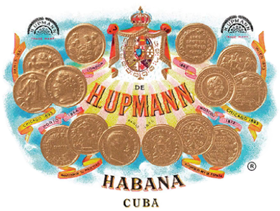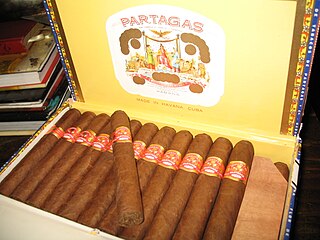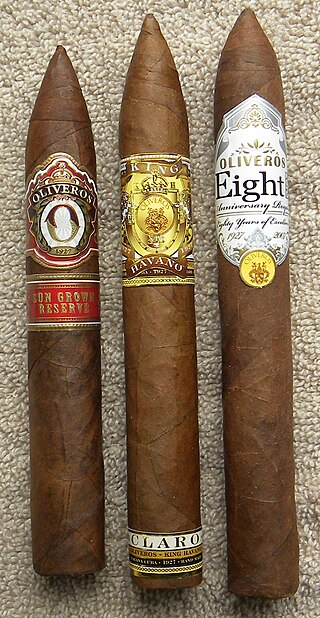
Estelí, officially Villa de San Antonio de Pavia de Estelí is a city and municipality within the Estelí department. It is the 8th largest city in Nicaragua due to the high urbanization of its municipality, at 84.8%, with an urban population of 111,244. It is also the 8th largest municipality, and an active commercial center in the north, known as "the Diamond of the Segovia" and the de facto capital of the north.

Cuban cigars are cigars manufactured in Cuba from tobacco grown within that island nation. Historically regarded as among the world's “finest”, they are synonymous with the island's culture and contribute over one quarter of the value of all exports from the country.

Cohiba is a brand for two kinds of premium cigar, one produced in Cuba for Habanos S.A., the Cuban state-owned tobacco company, and the other produced in the Dominican Republic for US-based General Cigar Company.

Bolívar is the name of two brands of premium cigar, one produced on the island of Cuba for Habanos SA, the Cuban state-owned tobacco company, and the other produced in the Dominican Republic from Dominican and Nicaraguan tobacco for General Cigar Company, which is today a subsidiary of Scandinavian Tobacco Group. Both are named for the South American revolutionary, Simón Bolívar.

H. Upmann is a Cuban brand of premium cigars established by banker Hermann Dietrich Upmann. The brand is currently owned by a British corporation, Imperial Brands. The cigars are manufactured by Habanos S.A., the state-owned tobacco company in Cuba, and Altadis in La Romana, Dominican Republic.

Arturo Fuente is a cigar brand founded by Arturo Fuente, Sr. in 1912 in West Tampa, Florida. Following a catastrophic fire in 1924, the brand had a production freeze for 22 years, reemerging in 1946 on a limited, local basis. Ownership was transferred to Arturo's younger son, Carlos Fuente, Sr. in 1958. Following the 1960 United States embargo of Cuba, the Fuente brand began a period of slow and steady growth, emerging as one of the most critically acclaimed makers of hand-rolled premium cigars outside of Cuba. As of 2010, the company was producing 30 million cigars per annum from its factory in the Dominican Republic.

Partagás is a brand name of cigars that are made by two independent & competing entities, one produced on the island of Cuba for Habanos SA, the Cuban state-owned tobacco company; the other, containing no Cuban tobacco, produced in the Dominican Republic for General Cigar Company, a division of Scandinavian Tobacco Group of Denmark.

Don José "Pepin" Garcia is the CEO of El Rey de los Habanos, Inc, a cigar company in Miami, also known as My Father Cigars. He is a noted cigar maker living in Miami, Florida. Born in Cuba, he is a master cigar roller and blender, and the creator and maker of numerous popular cigar brands.

Tatuaje is a brand of handmade premium cigar owned by Tatuaje Cigars, Inc. It was founded by Pete Johnson, with the assistance of José Garcia. The cigars are manufactured at the El Rey de los Habanos factory in Miami, Florida, and at Tabacalera Cubana S. A. (TACUBA) in Estelí, Nicaragua. Tatuaje also has a Private Social Club called “Saints & Sinners” which was created in 2011. In 2011, Tatuaje created the private social club "Saints & Sinners".

Don Pepín García is a brand of cigar owned by El Rey de los Habanos, Inc.
Ernesto Padilla is a Cuban-American artist, graphic designer and cigar maker. He is the son of Cuban poet, Heberto Padilla.

La Real Fabrica de Tabacos Partagás, also known as The Royal Partagás Cigar Factory, is a cigar factory museum in Havana, Cuba. The world-famous habanos cigars are produced in this factory. Across the street from the massive Capitol building in Havana, it was one of Cuba's oldest cigar factories.

Piloto Cigars Inc. is a private company that produces the Padrón cigar brand from Nicaragua. Commonly known as Padrón Cigars, the company was founded in September 8, 1964, in Miami, Florida, by Cuban-native José Orlando Padrón. In 1970, Padrón moved the company to Estelí, Nicaragua.

Don Rolando Reyes Sr. was a well-known Honduran cigar maker of Cuban origin formerly residing in Danlí, Honduras. He was a master blender, roller and is the creator of Cuba Aliados, Puros Indios and other cigar brands.
Oliva Cigar Co. is the manufacturer of several brands of cigars primarily grown and produced in Nicaragua and sold internationally. Melanio Oliva began growing tobacco in Pinar del Río, Cuba, in 1886. In 1964, in the aftermath of the 1959 Cuban Revolution, Melanio's grandson Gilberto Oliva emigrated with his family to Spain before eventually moving to Nicaragua and re-entering the tobacco business. In 1995, Gilberto and his son, Gilberto Jr., launched the Gilberto Oliva brand, which became Oliva Cigar Co. The company is currently based in Miami Lakes, Florida.

Tabacalera Fernandez, best known to the English-speaking world as A.J. Fernandez Cigars, is a maker of cigars primarily grown and produced in Nicaragua and sold worldwide. The company is run by Abdel J. Fernandez, a third generation cigarmaker, and is a prominent manufacturer of cigars sold under a variety of labels, including "Man O'War," "Diesel," and "San Lotano".

General Cigar Company is the largest manufacturer of premium cigars in the world. It is a subsidiary of Scandinavian Tobacco Group with North American headquarters located in Richmond, Virginia.
Nestor Plasencia Sr. (born October 8, 1949 is a tobacco grower and cigar maker of Cuban descent whose factories in Honduras and Nicaragua produce over 30 million cigars a year. Contracting out the use of his factories to Rocky Patel and other leading brands, Plasencia remains one of the leading figures in the Central American cigar industry.

José Blanco is the former Senior Vice President of the oldest Nicaraguan cigar company, Joya de Nicaragua S.A., in Estelí, Nicaragua, and the former Sales Director of La Aurora, the oldest Dominican cigar company in Santiago, Dominican Republic.

Boutique Blends Cigars, formerly the Habana Cuba Cigar Company, is an American manufacturer of premium hand-rolled cigars based in Miami, Florida. The company was established in 1996 during the American cigar boom as the non-Cuban manufacturer of the historic Cuban "Oliveros" brand. The company was sold in 2002 to a new ownership group consisting of the Cuban-born Rafael Nodal, his wife Alina Cordoves Nodal, and Hank Bischoff.

















